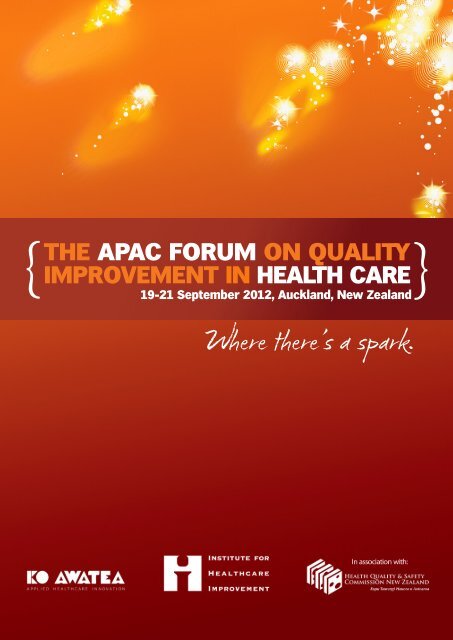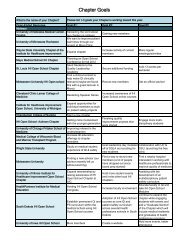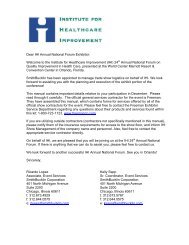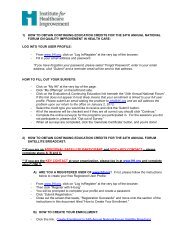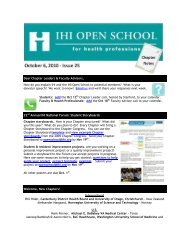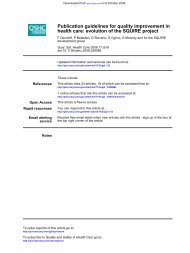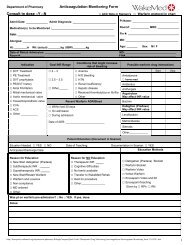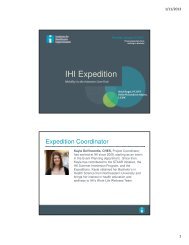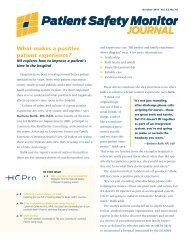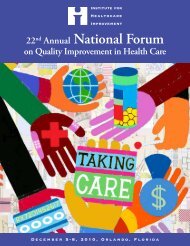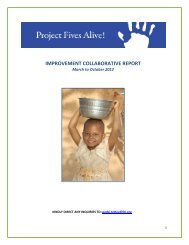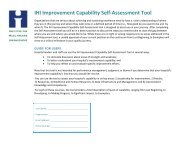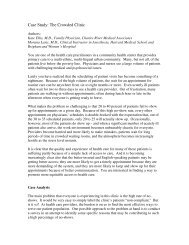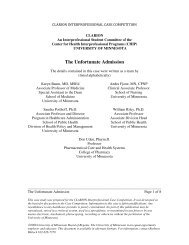Where there's a spark. - Institute for Healthcare Improvement
Where there's a spark. - Institute for Healthcare Improvement
Where there's a spark. - Institute for Healthcare Improvement
Create successful ePaper yourself
Turn your PDF publications into a flip-book with our unique Google optimized e-Paper software.
THE APAC FORUM ON QUALITY<br />
IMPROVEMENT IN HEALTH CARE<br />
19-21 September 2012, Auckland, New Zealand<br />
<strong>Where</strong> there’s a <strong>spark</strong>.
<strong>Where</strong> there’s a <strong>spark</strong><br />
THERE’S A WAY FORWARD.<br />
4
Join with hundreds of health care<br />
leaders from nations around the world<br />
to ignite new ideas and shape the future<br />
of health care. The possible becomes<br />
real at the APAC Forum on Quality<br />
<strong>Improvement</strong> in Health Care. Now that<br />
you’re here, take full advantage of<br />
everything this one-of-a-kind event<br />
has to offer.<br />
Together, the <strong>Institute</strong> <strong>for</strong> <strong>Healthcare</strong><br />
<strong>Improvement</strong> (IHI) and Ko Awatea<br />
have set the stage <strong>for</strong> you to “better your<br />
best” and affect real change in your<br />
organisation—and in health care at large.<br />
Over the course of three days, you have<br />
the opportunity to attend keynote<br />
presentations by health care thought<br />
leaders, participate in intensive workshops,<br />
and network with diverse professionals.<br />
New connections. New perspectives.<br />
New approaches to solving health care<br />
problems. Immerse yourself in the APAC<br />
Forum and imagine what you and your<br />
peers could <strong>spark</strong>.<br />
CONTENTS<br />
Agenda-at-a-Glance............Inside Cover<br />
About IHI and Ko Awatea............. pg. 5<br />
Welcome letter.............................. pg. 2<br />
Keynote speakers........................... pg. 3<br />
Pre-Conference intensives..........pgs. 4-5<br />
Thursday workshops..................pgs. 6-7<br />
Friday workshops......................pgs. 8-9<br />
Conference in<strong>for</strong>mation.............. pg. 10<br />
Facility in<strong>for</strong>mation..................... pg. 10<br />
Maps........................................... pg. 12<br />
THANK YOU<br />
to our main conference sponsor<br />
Share your APAC Forum experience with us using Twitter #apac<strong>for</strong>um<br />
1
AGENDA at -a-Glance<br />
WEDNESDAY 19 SEPTEMBER • PRE-CONFERENCE INTENSIVES<br />
9:00 AM – 3:00 PM I1: Patient- and Family-<br />
Centred Care: Partnerships<br />
<strong>for</strong> Improving the Patient<br />
Experience, Safety, and Quality<br />
Location: Auckland 1-2 (pg. 4)<br />
I2: Ready, Aim, Fire:<br />
A Systematic Approach to<br />
Improving Patient Safety<br />
Location: Auckland 3-4 (pg. 4)<br />
I3: Achieving the IHI<br />
Triple Aim<br />
Location: Epsom 1-3 (pg. 4)<br />
I4: Chairs and Chiefs: The<br />
Role of the Board in Quality<br />
and Safety<br />
Location: Marlborough 1-3 (pg. 4)<br />
I5: Better Quality Through<br />
Better Measurement<br />
Location: New Zealand<br />
Ballroom 1 (pg. 5)<br />
I6: National Quality<br />
<strong>Improvement</strong> Day<br />
Location: Ko Awatea<br />
Note: this session ends at 4:00 PM<br />
(pg. 5)<br />
THURSDAY 20 SEPTEMBER • GENERAL CONFERENCE DAY ONE<br />
8:00 AM – 8:45 AM<br />
Powhiri/Welcome<br />
Location: New Zealand Ballroom<br />
8:45 AM – 9:00 AM<br />
Opening of the APAC Forum<br />
Location: New Zealand Ballroom<br />
9:00 AM – 10:00 AM<br />
Keynote One: Maureen Bisognano<br />
Location: New Zealand Ballroom (pg. 3)<br />
10:15 AM – 11:30 AM Workshop Session A (All A workshops repeat as B workshops except <strong>for</strong> A1 and B1.)<br />
A1: Achieving the IHI Triple Aim<br />
Location: New Zealand Ballroom<br />
(pg. 6 )<br />
A2: Equity in Health Care:<br />
The What, The Why, and<br />
the How<br />
Location: Marlborough 1-3 (pg. 6)<br />
A3: Back to Basics:<br />
The Fundamentals of<br />
<strong>Improvement</strong><br />
Location: Epsom 1-3 (pg. 6)<br />
A4: Creating a<br />
Culture of Innovation<br />
Location: Auckland 1-2 (pg. 6)<br />
A5: Patient- and Family-<br />
Centred Care: Partnerships<br />
<strong>for</strong> Improving the Patient<br />
Experience, Safety, and Quality<br />
Location: Auckland 3-4 (pg. 6 )<br />
11:30 AM – 12:30 PM<br />
Lunch<br />
12:30 PM – 1:45 PM Workshop Session B (All A workshops repeat as B workshops except <strong>for</strong> A1 and B1.)<br />
B1: The Changing Face of<br />
Health Care: The Asia-Pacific<br />
Story<br />
Location: New Zealand Ballroom<br />
(pg. 6)<br />
B2: Equity in Health Care:<br />
The What, The Why, and<br />
the How<br />
Location: Marlborough 1-3 (pg. 6)<br />
2:00 PM – 3:15 PM Workshop Session C<br />
C1: Global Lessons: System<br />
Change Experiences from<br />
New Zealand and England<br />
Location: New Zealand Ballroom<br />
(pg. 7)<br />
B3: Back to Basics:<br />
The Fundamentals of<br />
<strong>Improvement</strong><br />
Location: Epsom 1-3 (pg. 6)<br />
B4: Creating a<br />
Culture of Innovation<br />
Location: Auckland 1-2 (pg. 6)<br />
C2: From the Top: The Role<br />
of the Board in Quality<br />
and Safety<br />
Location: Epsom 1-3 (pg. 7)<br />
C3: Thinking Differently to<br />
Trans<strong>for</strong>m Care<br />
Location: Auckland 1-2 (pg. 7)<br />
B5: Patient- and Family-<br />
Centred Care: Partnerships<br />
<strong>for</strong> Improving the Patient<br />
Experience, Safety, and Quality<br />
Location: Auckland 3-4 (pg. 6)<br />
C4: Measuring All-Cause<br />
Harm: Using the IHI Global<br />
Trigger Tool (GTT)<br />
Location: Auckland 3-4 (pg. 7)<br />
C5: Future-Proofing<br />
Child Health<br />
Location: Marlborough 1-3 (pg. 7)<br />
3:30 PM – 4:30 PM<br />
6:00 PM – 10:00 PM<br />
Keynote Two: J. A. Muir Gray, MD<br />
Location: New Zealand Ballroom (pg. 3)<br />
A Night at the Museum: Dinner and Reception (Auckland War Memorial Museum)<br />
Complimentary round-trip shuttle service available from SkyCity Convention Center
FRIDAY 21 SEPTEMBER • GENERAL CONFERENCE DAY TWO<br />
7:45 AM – 8:45 AM<br />
Special Interest Breakfasts<br />
SIB1: Seismic Trans<strong>for</strong>mation—Lessons from<br />
the Canterbury Health System<br />
Location: Auckland 1-2<br />
Facilitators: David Meates, CEO, Canterbury District<br />
Health Board; Nigel Millar, MD, Chief Medical Officer<br />
and Geriatrician, Canterbury District Health Board<br />
SIB2: NHSi Co-Design Programme<br />
Location: Auckland 3-4<br />
Facilitator: Lynne Maher, PhD, Director <strong>for</strong><br />
Innovation and Design, NHS <strong>Institute</strong> <strong>for</strong> Innovation<br />
and <strong>Improvement</strong>, United Kingdom<br />
9:00 AM – 10:00 AM<br />
Keynote Three: Harry Pert, MD<br />
Location: New Zealand Ballroom (pg. 3)<br />
10:15 AM – 11:30 AM Workshop Session D<br />
D1: The Science of Allocative<br />
Decision Making —Investment<br />
and Disinvestment<br />
Location: New Zealand Ballroom<br />
(pg. 8)<br />
D2: Research and Evidence<br />
in Primary Care<br />
Location: Marlborough 1-3 (pg. 8)<br />
D3: The Business Case:<br />
Investing in Quality<br />
Location: Auckland 1-2 (pg. 8)<br />
D4: Building Capacity <strong>for</strong><br />
Middle Managers<br />
Location: Epsom 1-3 (pg. 8)<br />
D5: Building an Integrated<br />
Approach to <strong>Improvement</strong><br />
with Lean, Six Sigma, and<br />
the Model <strong>for</strong> <strong>Improvement</strong><br />
Location: Auckland 3-4 (pg. 8)<br />
11:30 AM – 12:30 PM<br />
Lunch<br />
12:30 PM – 1:45 PM Workshop Session E<br />
E1: Creating Resilience in an<br />
Organisation: Preparing For<br />
an Unimaginable Disaster<br />
Location: New Zealand Ballroom<br />
(pg. 9)<br />
E2: Right People, Right Skills:<br />
The Role of the Health Care<br />
Work<strong>for</strong>ce in Quality<br />
<strong>Improvement</strong><br />
Location: Epsom 1-3 (pg. 9)<br />
E3: The Right Technology:<br />
Why Is It All So Hard?<br />
Location: Auckland 3-4 (pg. 9)<br />
E4: Patients First: Building a<br />
Lighthouse in a Sea of Data<br />
Location: Auckland 1-2 (pg. 9)<br />
E5: Effecting Change to<br />
Promote the Rational Use<br />
of Medicines—A Whole<br />
System Approach<br />
Location: Marlborough1-3 (pg. 9)<br />
2:00 PM – 3:00 PM<br />
Keynote Four: Donald M. Berwick, MD, MPP<br />
Location: New Zealand Ballroom (pg. 3)<br />
Special Evening Event<br />
A NIGHT AT THE MUSEUM<br />
THURSDAY 20 SEPTEMBER, 6:00 PM – 10:00 PM<br />
Complimentary round-trip shuttle service is available from SkyCity Convention Center<br />
Events Centre<br />
Auckland War Memorial Museum<br />
Domain Dr, Auckland Domain, Parnell 1142<br />
This is an evening to engage with innovative individuals both within, and related to, the Asia-Pacific<br />
health sector while dining on fine Kiwi cuisine. This key conference networking opportunity will<br />
allow <strong>for</strong> further connections through arts, music, and conversation.<br />
Featuring artists Marcus Winter and Tama Waipara and hosted by Pio Terei.<br />
Cost per person $NZ 100.00<br />
Cost per table of 10 $NZ 900.00<br />
Registration required—please visit the APAC Forum Registration desk at SkyCity to attend this event.<br />
This event sponsored by
Dear Colleagues,<br />
E nga mana, e nga reo,<br />
E nga karangatanga o te Ao hurihuri<br />
Naumai, haere mai ki te huihuinga rangatira o te Ao Hauora.<br />
Tena koutou, tena koutou, tena tatou katoa<br />
We never know what will <strong>spark</strong> a revolution. Thirty years ago in the United States, a small group<br />
of health care leaders got curious about the quality improvement and innovation methods used in<br />
commercial manufacturing, technology companies, and aviation. Their interest and early explorations<br />
<strong>spark</strong>ed a movement to dramatically trans<strong>for</strong>m the quality of health care delivery, a movement that<br />
has now spread across the globe. Just a few years ago, Geraint Martin, the CEO of Counties Manukau<br />
District Health Board in New Zealand, had his own <strong>spark</strong>. He dreamed of bringing people together<br />
in one place, supporting learning and innovation, to catalyze and accelerate improvement across his<br />
district. That <strong>spark</strong> led to collaboration with the <strong>Institute</strong> <strong>for</strong> <strong>Healthcare</strong> <strong>Improvement</strong> (IHI), and the<br />
result is Ko Awatea (Maori <strong>for</strong> “dawning of the first light”)—a new learning and innovation center in<br />
Auckland, New Zealand, that focuses on the unique health needs of the local population.<br />
IHI and Ko Awatea want to welcome you to the APAC Forum on Quality <strong>Improvement</strong> in Health Care—<br />
an event we know will cause a <strong>spark</strong> and lead to a new dawn <strong>for</strong> health care across the Asia-Pacific region.<br />
For more than 20 years, IHI’s Forums have convened people from all corners of the health care<br />
system and beyond to share learning, make new connections, and ignite new ideas <strong>for</strong> how we can<br />
improve health care and give our patients the best health system possible. The APAC Forum is just<br />
this kind of event. Over the next three days, you’ll have the opportunity to learn directly from the<br />
leaders of the global movement to improve health and health care. Through the keynote addresses,<br />
workshops, and countless networking opportunities, you and your teams of doctors, nurses, and<br />
other health professionals have access to the very latest thinking on how to improve care in a rapidly<br />
shifting environment.<br />
What makes us even more excited <strong>for</strong> this Forum is the opportunity to learn from you. As the<br />
movement to improve health care spreads from continent to continent, we are consistently inspired<br />
by the fountains of ideas and innovations that spring up everywhere. Convening people who share a<br />
passion <strong>for</strong> better health and health care is the best method we’ve found <strong>for</strong> advancing the science of<br />
improvement and discovering and disseminating new methods and approaches. We know the next<br />
few days will be a wonderful two-way street of learning and inspiration. We’re so thrilled to welcome<br />
you to Auckland and the APAC Forum. Enjoy!<br />
Sincerely,<br />
Maureen Bisognano<br />
President and CEO<br />
IHI<br />
Jonathon Gray<br />
Director<br />
Ko Awatea<br />
2 Share your APAC Forum experience with us using Twitter #apac<strong>for</strong>um
KEYNOTES<br />
Opening of the APAC Forum:<br />
The Honourable Jo Goodhew,<br />
Associate Minister of Health<br />
Thursday 20 September, 8:45 AM – 9:00 AM<br />
Location: New Zealand Ballroom<br />
Keynote One: Maureen Bisognano<br />
Thursday 20 September, 9:00 AM – 10:00 AM<br />
Location: New Zealand Ballroom<br />
Maureen Bisognano, President and CEO,<br />
IHI, previously served as IHI’s Executive<br />
Vice President and COO <strong>for</strong> 15 years. She is<br />
a prominent authority on improving health<br />
care systems, whose expertise is recognized<br />
by her elected membership to the <strong>Institute</strong><br />
of Medicine and by her appointment to The<br />
Commonwealth Fund’s Commission on a<br />
High Per<strong>for</strong>mance Health System, among other distinctions. Ms.<br />
Bisognano advises health care leaders around the world, is a frequent<br />
speaker at major health care conferences on quality improvement,<br />
and is a tireless advocate <strong>for</strong> change. She is also an Instructor of<br />
Medicine at Harvard Medical School, a Research Associate in the<br />
Brigham and Women’s Hospital Division of Social Medicine and<br />
Health Inequalities, and serves on the boards of the Commonwealth<br />
Fund, ThedaCare Center <strong>for</strong> <strong>Healthcare</strong> Value, and Mayo Clinic<br />
Health System—Eau Claire. Prior to joining IHI, she served as<br />
CEO of the Massachusetts Respiratory Hospital and Senior Vice<br />
President of The Juran <strong>Institute</strong>.<br />
Keynote Two: J.A. Muir Gray<br />
Thursday 20 September, 3:30 PM – 4:30 PM<br />
Location: New Zealand Ballroom<br />
J.A. Muir Gray, CBE, DSc, MD, FCLIP, is<br />
Director of the National Knowledge Service<br />
in the United Kingdom. The National<br />
Library <strong>for</strong> Health, a core service of the<br />
National Knowledge Service, will organise<br />
the best current knowledge and the National<br />
Knowledge service will deliver it to staff and<br />
patients wherever and whenever they need it.<br />
Sir Gray has recently been given the role of Chief Knowledge Officer<br />
<strong>for</strong> the National Health Service (NHS) and is closely involved<br />
in the provision of knowledge not only to clinicians but also to<br />
patients and those who manage health care. In his previous post as<br />
Director of Research and Development <strong>for</strong> the Anglia and Ox<strong>for</strong>d<br />
Region, Sir Gray was in a position to support the UK Cochrane<br />
Centre in its early days, and to set up the Centre <strong>for</strong> Evidence-<br />
Based Medicine. For 10 years, he was Programmes Director <strong>for</strong><br />
the UK National Screening Committee. Sir Gray is the author<br />
of Evidence-Based <strong>Healthcare</strong>, the third edition of which is in<br />
preparation, and joint author of The Ox<strong>for</strong>d Handbook of Public<br />
Health Practice. His most recent books are The Resourceful Patient,<br />
Evidence-Based Surgery, and How to Get Better Value <strong>Healthcare</strong>.<br />
Sir Gray’s most recent venture in 2008 has been to set up a charity<br />
called Knowledge into Action.<br />
Keynote Three: Harry Pert<br />
Friday 21 September, 9:00 AM – 10:00 AM<br />
Location: New Zealand Ballroom<br />
Harry Pert, MD is a General Practitioner in<br />
Rotorua, New Zealand. He is a visionary<br />
leader with a record of experience and<br />
leadership in both the College and<br />
Independent Practitioners’ Associations<br />
(IPAs). He founded one of the most<br />
innovative and successful IPAs in New<br />
Zealand, and has been a member of Royal<br />
New Zealand College of General Practice’s Quality Committee<br />
and Council. Dr. Pert has a reputation <strong>for</strong> innovation and openmindedness<br />
and is passionate about making a difference in general<br />
practice. Dr. Pert has taken a lead role in delivering seven<br />
successful national conferences and is a frequent speaker at<br />
many others throughout Australasia. Dr. Pert was elected President<br />
of the Royal New Zealand College of General Practice in 2009.<br />
Keynote Four: Donald M. Berwick<br />
Friday 21 September, 2:00 PM – 3:00 PM<br />
Location: New Zealand Ballroom<br />
Donald M. Berwick, MD, MPP, FRCP, is<br />
the <strong>for</strong>mer President and CEO of IHI, an<br />
organisation that he co-founded and led<br />
<strong>for</strong> over 20 years. In July 2010, President<br />
Obama appointed Dr. Berwick to the<br />
position of Administrator of the Centers <strong>for</strong><br />
Medicare & Medicaid Services, a position he<br />
held until December 2011. A pediatrician by<br />
background, Dr. Berwick has served on the faculty of the Harvard<br />
Medical School and Harvard School of Public Health, and on the<br />
staffs of Boston’s Children’s Hospital Medical Center, Massachusetts<br />
General Hospital, and the Brigham and Women’s Hospital. He<br />
has also served as Vice Chair of the US Preventive Services Task<br />
Force, the first “Independent Member” of the American Hospital<br />
Association Board of Trustees, and chair of the National Advisory<br />
Council of the Agency <strong>for</strong> <strong>Healthcare</strong> Research and Quality. He<br />
served two terms on the <strong>Institute</strong> of Medicine’s (IOM’s) governing<br />
Council, was a member of the IOM’s Global Health Board, and<br />
served on President Clinton’s Advisory Commission on Consumer<br />
Protection and Quality in the <strong>Healthcare</strong> Industry. Recognized as<br />
a leading authority on health care quality and improvement,<br />
Dr. Berwick has received numerous awards <strong>for</strong> his contributions.<br />
In 2005, he was appointed “Honorary Knight Commander of the<br />
British Empire” by the Queen of England in recognition of his<br />
work with the British National Health Service. Dr. Berwick is the<br />
author or co-author of over 150 scientific articles and four books.<br />
3
Pre-Conference<br />
INTENSIVES<br />
Pre-Conference Intensives: 9:00 AM – 3:00 PM<br />
I1: Patient- and Family-Centred Care:<br />
Partnerships <strong>for</strong> Improving the Patient<br />
Experience, Safety, and Quality<br />
Location: Auckland 1-2<br />
Patient and family-centred care provides the framework and strategy<br />
<strong>for</strong> improving the experience of care, clinical safety, and quality.<br />
Partnerships with patients, clients, and families are essential in care<br />
and care planning and decision-making. These partnerships are also<br />
essential in health care redesign, quality improvement, and safety<br />
initiatives. High-per<strong>for</strong>ming health care organisations develop<br />
authentic, sustained partnerships; create a variety of ways to hear<br />
patient and family stories; and truly learn from patient and family<br />
insights and perspectives. Practical strategies and tools <strong>for</strong> achieving<br />
these aims will be shared in this session.<br />
At the end of this session, delegates will be able to:<br />
• Describe the core concepts of patient-, client-, and family-centred<br />
care and how they challenge traditional definitions<br />
• Discuss practical strategies <strong>for</strong> partnering with patients<br />
and families to improve quality and safety and trans<strong>for</strong>m<br />
organisational culture<br />
• Articulate the importance of opportunities to hear patient and<br />
family stories and use effective methods <strong>for</strong> facilitating patient<br />
and family panels<br />
Beverley Johnson, President and CEO, <strong>Institute</strong> <strong>for</strong> Patient- and Family-<br />
Centered Care, USA; Bruce Arroll, Professor, Department of General<br />
Practice and Primary Health Care, University of Auckland, New Zealand;<br />
Karen Hoare, PhD, Senior Lecturer, School of Nursing and Department<br />
of General Practice and Primary Health Care, University of Auckland,<br />
New Zealand<br />
I2: Ready, Aim, Fire: A Systematic Approach<br />
to Improving Patient Safety<br />
Location: Auckland 3-4<br />
There is a great deal of activity in safety these days—but are we<br />
organising the work in a meaningful way that drives actual<br />
improvement <strong>for</strong> patients? In order to improve anything, you have<br />
to understand the problem you are trying to solve. This session will<br />
cover ways to develop tools to diagnose patient safety, how to set<br />
ambitious aims, and measures to track improvement. In addition,<br />
faculty will share an organising framework to put all the pieces together<br />
that ensures a systematic approach to measurable improvement.<br />
At the end of this session, delegates will be able to:<br />
• Appraise the usefulness of diagnostic tools to improve the safety<br />
and quality at their organisation<br />
• Describe the use of aims in driving improvement in patient safety<br />
• Differentiate between projects, portfolios, and large system<br />
measures and the role each plays in improvement work<br />
Carol Haraden, PhD, Vice President, IHI, USA; Nellie Yeo, MBA, MN,<br />
Chief Quality Officer and Executive Director, National <strong>Healthcare</strong> Group<br />
Pte Ltd, Singapore<br />
I3: Achieving the IHI Triple Aim<br />
Location: Epsom 1-3<br />
IHI Triple Aim organisations pursue better health <strong>for</strong> populations,<br />
improve the experience of care, and lower per capita costs. This<br />
session will cover what faculty have learned from work on the<br />
IHI Triple aim over the last five years.<br />
At the end of this session, delegates will be able to:<br />
• Articulate the framework needed to pursue the IHI Triple Aim<br />
• Share lessons learned from IHI Triple Aim regional sites<br />
John Whittington, MD, Faculty, IHI, USA; David Grayson, MB ChB,<br />
FRACS, Otolaryngologist and Clinical Lead, 20,000 Bed Days Campaign,<br />
Counties Manukau District Health Board, New Zealand; Peter Didsbury,<br />
MD, Chairman of the Board, ProCare Health Limited, New Zealand<br />
I4: Chairs and Chiefs: The Role of the Board<br />
in Quality and Safety<br />
Location: Marlborough 1-3<br />
This session will describe the role of governance, executive, and<br />
clinical leadership in overseeing quality and safety. Emphasis is<br />
placed on effective integration of aims and outcomes (quality, cost,<br />
service, satisfaction) and enhancing value to achieve savings in<br />
annual operation costs. Through the use of mock Board meetings,<br />
delegates will have the opportunity to wrestle with some of the<br />
most difficult problems faced by Boards and learn about best<br />
practices to overcome them.<br />
At the end of this session, delegates will be able to:<br />
• List three changes they can apply to improve their Board’s<br />
oversight of quality<br />
• Discuss three innovative best practices each Board can<br />
implement today<br />
• Identify specific opportunities to decrease direct cost while<br />
improving quality<br />
Donald Berwick, MD, MPP, Former President and CEO, IHI, USA;<br />
Geraint Martin, BA, MSc, CEO, Counties Manukau District Health<br />
Board, New Zealand; Alan Merry, Professor of Anaesthesiology and Head<br />
of the School of Medicine, University of Auckland, New Zealand; Anthony<br />
Hill, Health and Disability Commissioner, Health and Disability<br />
Commission, New Zealand<br />
4 Share your APAC Forum experience with us using Twitter #apac<strong>for</strong>um
Wednesday 19 September 2012<br />
I5: Better Quality Through Better Measurement<br />
Location: New Zealand Ballroom 1<br />
Good decision-making is based on data that is collected and analysed<br />
in a systematic way. This session will provide a framework and practical<br />
recommendations <strong>for</strong> avoiding roadblocks during your quality measurement<br />
journey. How to link measurement and improvement strategies will also<br />
be discussed. Case studies and exercises will demonstrate the application<br />
of measurement principles to health care topics.<br />
At the end of this session, delegates will be able to:<br />
• Distinguish between data <strong>for</strong> research, judgment, and improvement<br />
• Identify and build useful measures including operational definitions,<br />
sampling, and stratification<br />
• Articulate variation conceptually and statistically, and decide which<br />
control chart is most appropriate <strong>for</strong> their data<br />
Robert Lloyd, PhD, Executive Director, Per<strong>for</strong>mance <strong>Improvement</strong>, IHI, USA;<br />
Richard Hamblin, Director, Health Quality Evaluation, Health Quality and<br />
Safety Commission, New Zealand; Mary Seddon, Clinical Director, Ko Awatea,<br />
New Zealand<br />
Special Session<br />
I6: National Quality <strong>Improvement</strong> Day<br />
9:00 AM – 4:00 PM<br />
Location: Ko Awatea - Middlemore Hospital<br />
The National Quality <strong>Improvement</strong> Day is being held in<br />
association with the APAC Forum on Quality <strong>Improvement</strong> in<br />
Health Care. The day is jointly hosted by Ko Awatea at Counties<br />
Manukau DHB and the Health Quality & Safety Commission.<br />
The programme offers an opportunity <strong>for</strong> clinicians,<br />
researchers, administrators, and policy makers to present<br />
recently completed improvement projects.<br />
ABOUT IHI<br />
IHI is a leading innovator in health and<br />
health care improvement worldwide. For<br />
more than 25 years, we have partnered with<br />
an ever-growing community of visionaries,<br />
leaders, and front-line practitioners around<br />
the globe to <strong>spark</strong> bold, inventive ways<br />
to improve the health of individuals and<br />
populations. Together, we build the will <strong>for</strong><br />
change, seek out innovative new models<br />
of care, and spread proven best practices.<br />
IHI is dedicated to advancing four critical<br />
aims: optimize health care delivery systems,<br />
drive the Triple Aim <strong>for</strong> populations, realize<br />
person and family-centered care, and build<br />
improvement capability. When it comes to<br />
raising the quality of health <strong>for</strong> all, IHI sees<br />
boundless possibilities, and while we see the<br />
walls in front of us, we will not rest until we<br />
reach the other side.<br />
Learn more at www.IHI.org<br />
ABOUT<br />
KO AWATEA<br />
Ko Awatea (dawning of the first light) is<br />
about improvement and trans<strong>for</strong>mation,<br />
so that we can provide the very best health<br />
care to our community. To achieve this<br />
health care revolution, Ko Awatea will bring<br />
together the best expertise and leadership<br />
that New Zealand and the world have to<br />
offer, providing a focus on continuous<br />
improvement while inspiring the sharing<br />
of ideas and sustainable best practices. Ko<br />
Awatea is partnered with a number of leading<br />
organisations, including Massachusetts-based<br />
<strong>Institute</strong> <strong>for</strong> <strong>Healthcare</strong> <strong>Improvement</strong> (IHI).<br />
Learn more at www.koawatea.co.nz<br />
5
WORKSHOPS<br />
Keynote One: Maureen Bisognano<br />
9:00 AM – 10:00 AM (See pg. 3)<br />
A workshops: 10:15 AM – 11:30 AM<br />
B workshops: 12:30 PM – 1:45 PM<br />
All A workshops repeat as B workshops except <strong>for</strong> A1 and B1.<br />
C workshops: 2:00 PM – 3:15 PM<br />
Keynote Two: J.A. Muir Gray<br />
3:30 PM – 4:30 PM (See pg. 3)<br />
A1: Achieving the IHI Triple Aim<br />
Location: New Zealand Ballroom<br />
IHI Triple Aim organisations pursue better health <strong>for</strong> populations,<br />
improve the experience of care, and lower per capita costs. This<br />
session will cover what faculty have learned from work on the IHI<br />
Triple Aim over the last five years.<br />
At the end of this session, delegates will be able to:<br />
• Articulate the framework needed to pursue the IHI Triple Aim<br />
• Share lessons learned from IHI Triple Aim regional sites<br />
John Whittington, MD, Faculty, IHI, USA; David Grayson, MB ChB,<br />
FRACS, Otolaryngologist and Clinical Lead, 20,000 Bed Days Campaign,<br />
Counties Manukau District Health Board, New Zealand; Peter Didsbury,<br />
MD, Chairman of the Board, ProCare Health Limited, New Zealand<br />
B1: The Changing Face of Health Care:<br />
The Asia-Pacific Story<br />
Location: New Zealand Ballroom<br />
If the 20 th century was the era of the hospital, then the 21 st century<br />
is the era of the system. The values and behaviours that characterised<br />
the delivery of health care in the last century will not be the values<br />
and behaviours that shape care in the future. Although all nations<br />
are facing similar problems, most have the same goal: To improve<br />
individual and population health while containing costs. How each<br />
nation approaches this in the 21 st century will differ according to<br />
their context and culture.<br />
At the end of this session, delegates will be able to:<br />
• Summarise why the face of health care needs to change<br />
• Articulate the principles that will underpin success <strong>for</strong> nations<br />
large and small, and rich and poor<br />
Donald Berwick, MD, MPP, Former President and CEO, IHI, USA;<br />
Chien Earn Lee, MBBS, M. Med, FAMS, CEO, Changi General Hospital,<br />
Singapore; Kevin Woods, Chief Executive, Ministry of Health and Director<br />
General of Health, New Zealand<br />
A2/B2: Equity in Health Care: The What,<br />
The Why, and the How<br />
Location: Marlborough 1-3<br />
Although the social costs of inequities in health care are understood,<br />
they remain difficult to deal with despite a range of interventions by<br />
governments. Failure to address this issue leads to a triple whammy:<br />
Poor health outcomes <strong>for</strong> selected groups in society, increased costs<br />
<strong>for</strong> all social agencies, and the inability of those affected to contribute<br />
to their communities and countries.<br />
At the end of this session, delegates will be able to:<br />
• Describe the concept of equity in health care and why it is<br />
important <strong>for</strong> nations to achieve it<br />
• Explain how different jurisdictions are approaching the challenge<br />
of achieving equity<br />
Pat Snedden, BA, B Com, Chair, Ports of Auckland and Former Chair, Counties<br />
Manukau DHB, Auckland DHB, Housing, New Zealand; Andrew Teuber,<br />
Chair, Alaskan Federation of Natives and Director, Alaska Native Tribal Health<br />
Consortium, USA; Lance O’Sullivan, MB ChB, General Practitioner, Kaitaia,<br />
New Zealand; Ross Bailie, MB ChB, MPhil, DM, Senior Principal Research<br />
Fellow, Menzies School of Health Research, Australia<br />
A3/B3: Back to Basics:<br />
The Fundamentals of <strong>Improvement</strong><br />
Location: Epsom 1-3<br />
So, you can explain what the letters PDSA mean. Great! But, are<br />
you able to successfully run multiple PDSA tests in one day, know<br />
when a change concept is ready <strong>for</strong> implementation, and then<br />
sustain the improvements? This workshop will provide a refresher<br />
<strong>for</strong> those who are stalled and a jump start <strong>for</strong> those who are new<br />
to the quality improvement journey. This session is built around<br />
the Model <strong>for</strong> <strong>Improvement</strong> (MFI) and will demonstrate how to<br />
link the three questions related to aim, measurement, and change<br />
concepts to the sequence <strong>for</strong> success.<br />
At the end of this session, delegates will be able to:<br />
• Give an overview of the MFI<br />
• Specify the differences between testing, implementing, and spreading<br />
• Identify key concepts and tools that should be part of their<br />
QI toolkit<br />
Nellie Yeo, MBA, MN, Chief Quality Officer and Executive Director,<br />
National <strong>Healthcare</strong> Group Pte Ltd, Singapore<br />
A4/B4: Creating a Culture of Innovation<br />
Location: Auckland 1-2<br />
The most successful and innovative organisations are those that<br />
encourage every employee to innovate, and then reward them<br />
<strong>for</strong> doing so. Innovation results from deliberate methods and<br />
organisational leadership actions. Through their behaviours, leaders<br />
create the conditions that either hinder or aid innovation. This<br />
session will illustrate practical frameworks that can be used by<br />
delegates in their own settings to trans<strong>for</strong>m health care services.<br />
At the end of this session, delegates will be able to:<br />
• Identify seven dimensions of organisational culture that<br />
support innovation<br />
• Assess the culture in teams and organisations<br />
• Describe actions that they can take to enhance innovation in<br />
their organisation<br />
Lynne Maher, PhD, Director <strong>for</strong> Innovation and Design, NHS <strong>Institute</strong> <strong>for</strong><br />
Innovation and <strong>Improvement</strong>, United Kingdom<br />
A5/B5: Patient- and Family-Centred Care:<br />
Partnerships <strong>for</strong> Improving the Patient<br />
Experience, Safety, and Quality<br />
Location: Auckland 3-4<br />
Patient and family-centred care provides the framework and strategy<br />
<strong>for</strong> improving the experience of care, clinical safety, and quality.<br />
Partnerships with patients, clients, and families are essential in care<br />
and care planning and decision-making. These partnerships are also<br />
essential in health care redesign, quality improvement, and safety<br />
initiatives. High-per<strong>for</strong>ming health care organisations develop<br />
authentic, sustained partnerships, create a variety of ways to hear<br />
patient and family stories, and truly learn from patient and family<br />
insights and perspectives. Practical strategies and tools <strong>for</strong> achieving<br />
these aims will be shared in this session.<br />
At the end of the session, delegates will be able to:<br />
• Describe the core concepts of patient-, client-, and family-centred<br />
care and how they challenge conventional definitions<br />
• Discuss practical strategies <strong>for</strong> partnering with patients and families to<br />
improve quality and safety and trans<strong>for</strong>m organisational culture<br />
• Articulate the importance of having opportunities to hear patient and<br />
family stories and use effective methods <strong>for</strong> facilitating patient and<br />
family panels<br />
Beverley Johnson, President and CEO, <strong>Institute</strong> <strong>for</strong> Patient- and Family-<br />
Centered Care, USA; Bruce Arroll, Professor, Department of General<br />
Practice and Primary Health Care, University of Auckland, New Zealand<br />
6 Share your APAC Forum experience with us using Twitter #apac<strong>for</strong>um
Thursday 20 September 2012<br />
C1: Global Lessons: System Change<br />
Experiences from New Zealand and England<br />
Location: New Zealand Ballroom<br />
The rise in demand <strong>for</strong> health care services has outstripped our ability<br />
to supply them. The quality of the care we provide is not always of<br />
the standard to which we aspire. Simply doing the same is no longer<br />
tenable, safe, or responsible. Counties Manukau District Health<br />
Board and its partners have committed to investing in staff through<br />
the development of Ko Awatea. In this session, faculty will describe<br />
a local initiative led by Ko Awatea with the aim to return to our<br />
community 20,000 days that are currently avoidable hospital bed<br />
days. Faculty will compare and contrast the Ko Awatea experience<br />
with that of the national QIPP programme in England. The QIPP<br />
programme was developed by the Department of Health to drive<br />
<strong>for</strong>ward quality improvements in NHS care, while also making up<br />
to £20 billion of efficiency savings by 2015.<br />
At the end of this session, delegates will be able to:<br />
• Specify the problems facing different health systems<br />
• Highlight what constitutes these systems of care<br />
• Summarise approaches that have, and have not, succeeded in<br />
delivering on the bold aspirations of these initiatives<br />
Geraint Martin, BA, MSc, CEO, Counties Manukau District Health<br />
Board, New Zealand; Maxine Power, PhD, MPH, National <strong>Improvement</strong><br />
Advisor and Safe Care National Work Stream Lead, QIPP, Department of<br />
Health, United Kingdom; Jonathon Gray, Director, Ko Awatea, Counties<br />
Manukau District Health Board and Professor of Health Innovation and<br />
<strong>Improvement</strong>, University of Auckland<br />
C2: From the Top: The Role of the Board in<br />
Quality and Safety<br />
Location: Epsom 1-3<br />
This workshop will demonstrate the critically important role of an<br />
engaged, in<strong>for</strong>med, and active Board of Directors in ensuring safety<br />
and quality. The presenters will emphasise real-life examples and<br />
practical advice <strong>for</strong> engaging Boards and leadership teams in the<br />
pursuit of better and safer care.<br />
At the end of this session, delegates will be able to:<br />
• Outline the importance of the role of the Board in quality<br />
and safety<br />
• Identify the key questions Boards should ask with regards to<br />
quality and safety<br />
• Implement concrete steps to effectively engage Boards<br />
Maureen Bisognano, President and CEO, IHI, USA; Shelly Park, Chief<br />
Executive, Southern Health, Australia<br />
C3: Thinking Differently to Trans<strong>for</strong>m Care<br />
Location: Auckland 1-2<br />
Innovation is a bit of a buzz word in health care, but it is here to<br />
stay. Innovation can make a real difference in quality, cost, and<br />
the patient experience. This session will illustrate how thinking<br />
differently can lead to doing differently—which in turn can lead to<br />
per<strong>for</strong>mance improvement. Participants will be equipped with tools<br />
that have been found to make a real difference in trans<strong>for</strong>ming care.<br />
At the end of this session, delegates will be able to:<br />
• Use the steps of a process <strong>for</strong> innovation<br />
• Challenge and change usual thinking<br />
• Specify a range of tools adapted from other industries that should<br />
be part of their QI toolkit<br />
Lynne Maher, PhD, Director <strong>for</strong> Innovation and Design, NHS <strong>Institute</strong> <strong>for</strong><br />
Innovation and <strong>Improvement</strong>, United Kingdom<br />
C4: Measuring All-Cause Harm: Using the IHI<br />
Global Trigger Tool (GTT)<br />
Location: Auckland 3-4<br />
It’s safe to say that reducing harm is a priority at virtually every<br />
health care delivery organisation in the world today. Progress is also<br />
notable in many places when it comes to significant reductions in<br />
infections associated with use of central lines, ventilators, resistant<br />
bacteria, or with events such as preventable patient falls. That’s the<br />
good news. The mixed news is that when independent researchers dig<br />
deep into patient charts and look <strong>for</strong> signs (or triggers) of adverse<br />
events using the IHI GTT, they’re finding higher rates of harm than<br />
even the most committed improvers realise. The goal of this session<br />
is to learn how to use the IHI GTT to first understand your harm<br />
rates and to ultimately improve patient safety.<br />
At the end of this session, delegates will be able to:<br />
• Distinguish between harm and error<br />
• Explain the value in measuring all-cause harm<br />
• Incorporate a measure of all-cause harm into current safety practices<br />
Carol Haraden, PhD, Vice President, IHI, USA; Gillian Robb, MPH,<br />
NZRP, Quality <strong>Improvement</strong> Manager, Ko Awatea, Counties Manukau<br />
District Health Board and Professional Teaching Fellow, University of<br />
Auckland, New Zealand<br />
C5: Future-Proofing Child Health<br />
Location: Marlborough 1-3<br />
Child health outcomes are poor in many parts of New Zealand,<br />
reflecting the relative poverty of many New Zealand children.<br />
While some determinants of child health are outside of our control,<br />
there are many issues where we can make an impact. The two<br />
paediatrician presenters of this workshop have extensive experience,<br />
both in improving child health in a large metropolitan city, and in<br />
a rural area: South Auckland and Hawke’s Bay. Faculty will share<br />
their experience and offer tips <strong>for</strong> getting the best out of<br />
community child health services.<br />
At the end of this session, delegates will be able to:<br />
• Explain how readily available data can be used to improve<br />
service, per<strong>for</strong>mance, and outcomes<br />
• Describe how collaboration with other services can improve the<br />
effectiveness of interventions in the community<br />
• Identify two examples of interventions implemented in New<br />
Zealand that are changing childrens’ lives<br />
Russell Wills, FRACP, Paediatrician, Hawke’s Bay Hospital, New Zealand;<br />
Adrian Trenholme, BChir, MB, FRACP, Paediatrician, Counties Manukau<br />
District Health Board, New Zealand<br />
7
WORKSHOPS<br />
Special Interest Breakfasts: 7:45 AM – 8:45 AM<br />
(See Agenda-at-a-Glance <strong>for</strong> more in<strong>for</strong>mation)<br />
Keynote Three: Harry Pert<br />
9:00 AM – 10:00 AM (See pg. 3)<br />
D workshops: 10:15 AM – 11:30 AM<br />
E workshops: 12:30 PM – 1:45 PM<br />
Keynote Four: Donald M. Berwick<br />
2:00 PM – 3:00 PM (See pg. 3)<br />
D1: The Science of Allocative Decision Making—<br />
Investment and Disinvestment<br />
Location: New Zealand Ballroom<br />
For the past seven years, Auckland District Health Board (ADHB)<br />
has used a hospital-based health technology assessment committee<br />
called the Clinical Practice Committee (CPC) to evaluate new and<br />
existing health technologies to determine which of these should be<br />
implemented, restricted, or disinvested. To enable comparison of<br />
very disparate technologies, the CPC has developed a scoring tool<br />
that has proven useful when giving advice to ADHB managers.<br />
There is clear evidence that these scores are highly influential in<br />
determining if technologies are adopted. In today’s financiallyconstrained<br />
environment, it seems appropriate to use such evidencebased<br />
tools to determine where expenditure priorities ought to be.<br />
An overview of the work of the CPC will also be presented.<br />
At the end of this session, delegates will be able to:<br />
• Describe two examples of how clinically-led groups were able to<br />
introduce new services and interventions in tough economic<br />
times<br />
• Explain the evidence-based approach that has been successfully<br />
implemented in the Counties Manakau District Health Board<br />
Gloria Johnson, Chief Medical Officer, Counties Manukau District Health<br />
Board, New Zealand; Stephen Streat, Medical Director and Intensive Care<br />
Specialist, New Zealand; Emma Parry, Clinical Director, Maternal Fetal<br />
Medicine, Department of Obstetrics and Gynaecology, Auckland District<br />
Health Board, New Zealand; Anita Fitzgerald, Clinical Practice Committee<br />
Manager, Auckland District Health Board, New Zealand<br />
D2: Research Evidence and Quality in<br />
Primary Care<br />
Location: Marlborough 1-3<br />
In this workshop, presenters will use practical examples from<br />
general practice and primary care settings to discuss to what extent<br />
research evidence can be translated into quality practice. Delegates<br />
will take part in a debate about five key issues. The first issue: What<br />
happens in cases like immunisation, where good scientific evidence<br />
can be translated into quality practice. The second: Leaping into<br />
the void of unmet need. Many of the present debates in screening<br />
pit reluctant evidence against obvious clinical need. How does<br />
the prudent clinician respond? Thirdly, we’ll use the case study of<br />
obesity and discuss why the application of available evidence seems<br />
so hard to translate into effective action. Next, we’ll explore<br />
adherence and the clinical reality of primary care. Finally, we’ll<br />
discuss the language of evidence, and how even objective evidence<br />
is prone to subjective bias.<br />
At the end of this session, delegates will be able to:<br />
• Illustrate how research evidence can be translated into<br />
quality practice<br />
• Use insights from a debate to fuel current work practices<br />
Tony Dowell, Professor of Primary Health Care and General Practice,<br />
Deputy Dean, University of Otago – Wellington, New Zealand;<br />
Dee Mangin, Associate Professor and Director, Primary Care Research Unit,<br />
University of Otago, New Zealand<br />
D3: The Business Case: Investing in Quality<br />
Location: Auckland 1-2<br />
All health care organisations and systems have an ethical, moral,<br />
and fiscal responsibility to ensure that their scarce resources are<br />
used effectively. Resources must be adequately allocated to improve<br />
health services to individuals and their families, and to improve<br />
the overall health of populations. This is particularly true in today’s<br />
tough financial times.<br />
At the end of this session, delegates will be able to:<br />
• Articulate how one major health care organisation released<br />
$38 million through a rigorous approach to reducing waste<br />
and increasing value<br />
• Create the foundation <strong>for</strong> collaboration between clinical staff<br />
and Chief Financial Officers<br />
Geraint Martin, BA, MSc, CEO, Counties Manukau District Health<br />
Board, New Zealand; Ron Pearson, Deputy Chief Executive, Counties<br />
Manakau District Health Board, New Zealand; Chien Earn Lee, MBBS, M.<br />
Med, FAMS, CEO, Changi General Hospital, Singapore; J.A. Muir Gray,<br />
CBE, DSc, MD, FCLIP, Director, National Knowledge Service and Chief<br />
Knowledge Officer, NHS, United Kingdom<br />
D4: Building Capacity <strong>for</strong> Middle Managers<br />
Location: Epsom 1-3<br />
This interactive session will focus on the leadership attributes<br />
necessary <strong>for</strong> middle managers, specifically in regards to quality<br />
and safety. Faculty will look at leadership competencies and their<br />
relationship to health care improvement. In addition, faculty will<br />
describe how to deliver microsystem improvement with a high<br />
degree of ownership and engagement of all staff.<br />
At the end of the session delegates will be able to:<br />
• Describe how to build leadership flexibility<br />
• Explain one appropriate leadership style <strong>for</strong> microsystem<br />
improvement<br />
• Articulate how leadership and clinical practice improvement<br />
work together to deliver improved care <strong>for</strong> patients<br />
Bernie Harrison, MPH (Hons), RN, RM, Director, Clinical Leadership<br />
Development and Training, Clinical Excellence Commission, Australia<br />
D5: Building an Integrated Approach to<br />
<strong>Improvement</strong> with Lean, Six Sigma, and<br />
the Model <strong>for</strong> <strong>Improvement</strong><br />
Location: Auckland 3-4<br />
What approach to quality improvement does your organisation<br />
follow? Lean? Six Sigma? The Model <strong>for</strong> <strong>Improvement</strong>? All have<br />
value, and yet many organisations send mixed messages to their<br />
employees, lacking what Deming called “constancy of purpose.”<br />
Some organisations claim they are following one approach this<br />
month, then state that another approach will be used next month.<br />
This workshop will help participants clarify the similarities and<br />
differences between the three approaches and provide a framework<br />
<strong>for</strong> organising overall quality improvement strategy.<br />
At the end of this session, delegates will be able to:<br />
• Describe the similarities and differences among Lean, Six Sigma,<br />
and the Model <strong>for</strong> <strong>Improvement</strong><br />
• Determine which approach(es) are most appropriate <strong>for</strong> their<br />
organisation<br />
• Initiate a plan to build an integrated quality improvement strategy<br />
Robert Lloyd, PhD, Executive Director, Per<strong>for</strong>mance <strong>Improvement</strong>, IHI,<br />
USA; Greg Balla, BE, Director, Per<strong>for</strong>mance and Provider Development,<br />
Auckland District Health Board, New Zealand<br />
8 Share your APAC Forum experience with us using Twitter #apac<strong>for</strong>um
Friday 21 September 2012<br />
E1: Creating Resilience in an Organisation:<br />
Preparing <strong>for</strong> an Unimaginable Disaster<br />
Location: New Zealand Ballroom<br />
When Christchurch was struck by a series of earthquakes in<br />
2010 and 2011, many organisations were not prepared <strong>for</strong> this<br />
unpredictable event or its aftermath. People in the Canterbury<br />
Health System, however, had been thinking about a disrupted<br />
working environment <strong>for</strong> quite a while. In this session, faculty will<br />
detail how scenario development was a catalyst <strong>for</strong> considering the<br />
unthinkable, and how this thinking was spread to thousands of<br />
people to prepare <strong>for</strong> the unimaginable.<br />
At the end of this session, delegates will be able to:<br />
• Explain the value of planning <strong>for</strong> the long term<br />
• Describe a unique approach <strong>for</strong> large-scale change<br />
• Apply a framework in their own organisations<br />
Roger Dennis, Consultant, Innovation Matters, New Zealand<br />
E2: Right People, Right Skills:<br />
The Role of the Health Care Work<strong>for</strong>ce<br />
in Quality <strong>Improvement</strong><br />
Location: Epsom 1-3<br />
Is your health system achieving great health outcomes? Have you<br />
been able to effectively manage chronic conditions, and are you<br />
ready to try new solutions? This workshop will identify current<br />
challenges in health care. We will consider local clinical networks<br />
and how the right people with the right skills can improve health<br />
outcomes in urban and rural settings.<br />
At the end of this session, delegates will be able to:<br />
• Identify health system underper<strong>for</strong>mance in a number of domains<br />
• Identify how the right people working with the right skills can<br />
generate quality improvement<br />
• Describe specific examples of work<strong>for</strong>ces that are making a difference<br />
Gregor Coster, CNZM, MB ChB, MSc, PhD, Chairman, Counties<br />
Manakau District Health Board, New Zealand; Jo Scott-Jones, MB ChB,<br />
FRNZCGP, Chairperson, Rural General Practice Network, New Zealand;<br />
Shelley Frost, RN, Director of Nursing, Pegasus Health and Deputy Chair,<br />
General Practice New Zealand<br />
E3: The Right Technology: Why Is It All So Hard?<br />
Location: Auckland 3-4<br />
Cost blow outs in health care delivery are often blamed on an<br />
explosion in expensive technologies. Manuel Castells, the renowned<br />
Spanish social commentator, states that investing and making the<br />
best use of the right technologies will be central to success <strong>for</strong><br />
organisations and nations in the 21 st century. So is technology<br />
our foe or our friend? In this session, delegates will learn how the<br />
innovative use of new technologies can trans<strong>for</strong>m health care.<br />
At the end of this session, delegates will be able to:<br />
• Describe how the innovative use of current technologies can<br />
trans<strong>for</strong>m health care<br />
• Explain principles, techniques, and approaches that can answer<br />
the hard questions about improving patient outcomes within a<br />
fixed budget<br />
J.A. Muir Gray, CBE, DSc, MD, FCLIP, Director, National Knowledge<br />
Service and Chief Knowledge Officer, National Health Service, United<br />
Kingdom; Ian McCrae, CE and Founder, Orion Health, New Zealand<br />
E4: Patients First: Building a Lighthouse in<br />
a Sea of Data<br />
Location: Auckland 1-2<br />
Ever get the feeling you are drowning in measures? This workshop will<br />
provide a roadmap, a set of principles, and some practical examples<br />
of achieving the right balance when implementing measures. This<br />
session will discuss how to create measures that matter; how to<br />
democratise the process including balancing top-down consistency<br />
<strong>for</strong> benchmarking with bottom-up feedback and design; and how to<br />
align in<strong>for</strong>mation. In addition, this session will provide road-tested<br />
measures to ensure a baseline and the ability to collect data.<br />
At the end of this session, delegates will be able to:<br />
• Identify the focal points needed to drive a small number of measures<br />
• Identify and harvest in<strong>for</strong>mation to in<strong>for</strong>m effective measures<br />
• Ensure measures have broad input while remaining consistent in<br />
definition and purpose<br />
Andrew Terris, Programme Director, Patients First, New Zealand;<br />
Richard Hamblin, Director, Health Quality Evaluation, Health Quality<br />
and Safety Commission, New Zealand<br />
E5: Effecting Change to Promote the Rational<br />
Use of Medicines—A Whole System Approach<br />
Location: Marlborough1-3<br />
This workshop will explore ways of promoting evidence-in<strong>for</strong>med<br />
patient- and family-centred care using the resources and skills of<br />
organised extended primary care networks linked in with secondary<br />
care. Faculty will present an example where the exponential rise of<br />
a dangerous, expensive, and ineffective prescribing practice was<br />
identified that was unnecessarily putting healthy babies and infants<br />
at risk. This alarming trend has been reversed by deploying a<br />
regional whole system approach, coordinated by a mature peer-led<br />
education programme based in Organised General Practice and<br />
Primary Care. The tension of balancing conflicting interpretations<br />
of evidence will also be explored.<br />
At the end of this session, delegates will be able to:<br />
• Describe the key elements of this whole system approach to<br />
affecting change in prescribing<br />
• Contrast the tensions of balancing conflicting interpretations of<br />
evidence with patient choice<br />
• Identify additional complexities in their understanding of the<br />
influences on prescribers<br />
Les Toop, MD, MRCGP, Professor of General Practice, University of<br />
Otago Christchurch, New Zealand<br />
9
Conference<br />
INFORMATION<br />
Shuttle Service<br />
Shuttle transportation will be provided <strong>for</strong> the following events:<br />
I6: National Quality <strong>Improvement</strong> Day<br />
Wednesday 19 September<br />
Departing Schedule:<br />
7:30 AM and 8:00 AM<br />
From Albert Street entrance of SKYCITY Convention Centre to<br />
Ko Awatea – Middlemore Hospital<br />
Returning Schedule:<br />
4:00 PM and 4:30 PM<br />
From Ko Awatea – Middlemore Hospital to SKYCITY<br />
Convention Centre<br />
A Night at the Museum Reception and Dinner<br />
Thursday 20 September<br />
Departing Schedule:<br />
5:45 PM and 6:15 PM<br />
From Albert Street entrance of SKYCITY Convention Centre to<br />
the Auckland War Museum<br />
Returning Schedule:<br />
9:00 PM, 9:30 PM, 10:00 PM, and 10:30 PM<br />
From Auckland War Museum to SKYCITY Convention Centre<br />
Attendees who miss the scheduled pick-up and drop-off times will<br />
need to arrange separate transportation to the above events. We<br />
recommend that you use Auckland Coop Taxis (09) 300-3000 <strong>for</strong><br />
your transportation needs around the city of Auckland.<br />
Thank You<br />
To Our Lead Conference Sponsor<br />
IHI and Ko Awatea would like to extend our thanks to<br />
the major sponsor of the APAC Forum, the Health Quality<br />
& Safety Commission New Zealand (HQSC NZ).<br />
Convention Service Desk (Business Center)<br />
The following range of support services are available at the<br />
Convention Services Desk located on Level 4 of the SKYCITY<br />
Auckland Convention Centre:<br />
• Word processing<br />
• Photocopying<br />
• Laser printing (colour or black and white)<br />
• Binding<br />
• PowerPoint assistance<br />
• Laminating<br />
• Faxing<br />
• E-mail<br />
• Internet<br />
The desk’s hours of operation are 8:00 AM – 5:00 PM. There are<br />
two additional locations:<br />
SKYCITY Hotel<br />
Located on level 2, one computer that can be used any time,<br />
not staffed<br />
SKYCITY Grand Hotel<br />
Located on level 7, one computer with printer that can be used any<br />
time, not staffed<br />
Fitness Centre<br />
The SKYCITY Grand Hotel offers a gymnasium with a 25 metre<br />
heated lap pool, sauna, and spa pool, and access to personal trainers.<br />
There is a fitness centre located on level 7 of the SKYCITY Grand<br />
Hotel. SKYCITY Hotel guests can use the air bridge and go<br />
through the Convention Centre to the Grand Hotel.<br />
Check Out & Luggage Storage<br />
Please check out of your guest room, at either the SKYCITY Hotel<br />
or SKYCITY Grand Hotel, by 11:00 AM on the final day of your<br />
stay. Please store your luggage at the bell stand located on the lobby<br />
level of each hotel.<br />
Complimentary Wireless Access<br />
Complimentary wireless access will provided to all APAC Forum<br />
delegates. To access complimentary wireless internet:<br />
1. Select “view available wireless networks” and connect to the<br />
SKYCITY Conference Network<br />
2. Open your internet browser<br />
3. When directed, enter the access code APAC2012<br />
Continuous Professional Development (CPD)<br />
This conference is endorsed by the Australasian College of Health<br />
Service Management (ACHSM) according to approved criteria.<br />
Attendance attracts 8 Continuous Professional Development (CPD)<br />
points as part of ACHSM’s CPD Programme if delegates attend the<br />
two-day General Conference programme only or 14 CPD points if<br />
attendance includes one of the pre-conference intensives along with<br />
the General Conference.<br />
Thank You to Our Sponsor<br />
www.aucklandnz.com<br />
10 Share your APAC Forum experience with us using Twitter #apac<strong>for</strong>um
Join us in Orlando, Florida, USA <strong>for</strong> IHI’s 24th Annual<br />
National Forum on Quality<br />
<strong>Improvement</strong> in Health Care<br />
9-12 December 2012<br />
defining moments<br />
www.IHI.org/Forum<br />
11
LEVEL 4 – CONVENTION CENTRE<br />
To access complimentary<br />
wireless Internet:<br />
1. Select “view available wireless<br />
networks” and connect to the<br />
SKYCITY conference network<br />
2. Open your internet browser<br />
3. When directed, enter the<br />
access code APAC2012<br />
Shuttle service pick-up and<br />
drop-off on Albert Street<br />
side of the Convention<br />
Centre street entrance.<br />
In<strong>for</strong>mation &<br />
Conference Registration<br />
Badge Edits, Payments,<br />
and Session changes<br />
LEVEL 5 – CONVENTION CENTRE<br />
Storyboard Display<br />
Presenter Lounge<br />
Exhibit Stands<br />
(Level 5 Promenade)<br />
Plenary Room Entrance<br />
(Plenary Room is the<br />
New Zealand Rooms<br />
combined)<br />
Exhibits<br />
12 Share your APAC Forum experience with us using Twitter #apac<strong>for</strong>um


